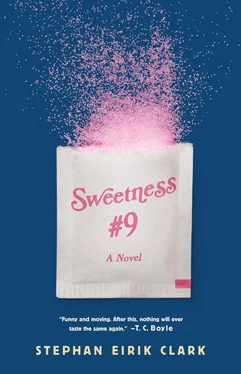If only to have something to do, I began writing members of Congress and newspaper reporters — anyone who might like to hear the story I could tell about Sweetness #9. If you look online, you’ll find a few articles from that time mentioning me by name. If you were to do a little more research, you’ll even discover that in the spring of 2002 I went before the House Energy and Commerce Subcommittee on Health to speak about the dangers of Sweetness #9. My timing was off, though: the congressmen I spoke with were only interested in the vulnerabilities of our food delivery system that might be most easily exploited by terrorists.
“Real threats,” the chairperson of this committee told me, “not fanciful stories about Nazis and mind-control pills.”
I’m not sure my writing this will do any more good than my visit to Washington. It won’t undo the damage I inflicted on my family or myself, and if experience is the only thing that teaches us anything, it won’t keep anyone from doing anything they shouldn’t. It will help me understand what I have and have not done, though (or what I believe I have and have not done), and I suppose that is a small good thing: to acknowledge one’s life, not just to oneself but to others.
Late in the summer of 2002, I flew with Ernest to San Diego and there rented a car and followed a meandering route north to Seattle. I was sure Priscilla had started a new life out west, and so we went from one farmer’s market to the next, hoping to see her peddling heirloom tomatoes or summer squash. The search proved fruitless (even after stops at Burning Man and the Rainbow Gathering), but all the same it was transformative. At some point I adopted what I came to call the Churchill Diet (nothing but greens and fresh milk and bread) and began dreaming of my own life here on the other coast. I had Magda’s photo in my wallet and all the money I’d come into as a result of selling FlavAmerica, and I wondered why I didn’t start over as a producer of small-batch organic sauerkraut.
Betty had said she’d be away for at least a year, but when we got back from our road trip we found she hadn’t written with news of an impending return. When three more months passed without any word, I sold our home and relocated with Ernest to an eighty-six-year-old farmhouse on a forty-acre plot of land in Potter Valley, more than three hours north of San Francisco.
For two years it was just the two of us and a few hired hands struggling to coax something edible up out of the dirt. Ernest flourished even as our crops floundered. I can’t say it was going back to the land that did it; there was no control group in this experiment. But in those two years he grew more than he had in the past ten. By the fall of 2005, when he was leaving for UC Davis without any firm academic plans, he didn’t just look like a man; he looked like a new person.
By then I had two goats that I kept tied to a series of iron poles across the property. They’re still here, and in addition to keeping the grass down, they provide all the milk I could ever need. The bread that I eat I bake myself, using a slow-rise method I learned about in the New York Times. (Some habits I’ll never give up; the paper, which I now read online, is one of them.) The rest of the food comes from the fields in back: a rotating crop of green leafy vegetables, most of which I sell at farmer’s markets in Ukiah, Kelseyville, and Willits. My most popular item is “Priscilla’s Famous Organic Sauerkraut,” which follows Magda’s recipe and can now be purchased at Whole Foods and several smaller natural food stores.
It was through this sauerkraut (or rather the website promoting it; we ship jars as far away as Japan and Beirut) that Betty, now using her maiden name, returned to me. She drove up one day in a rental car and walked out into the fields until I looked up and saw it was her. She was so incredibly thin. Even before I could cross the distance between us, a head of cabbage falling from the hold of my hand, I knew she must be sick.
It was cancer, and it was terminal, and she’d come back to learn about Priscilla. “Say she’s here,” she said. “Is she here?”
We were both crying by the time I was telling her the truth about Priscilla’s Famous Organic Sauerkraut. “It’s Magda’s recipe, the woman Ernst Eberhardt loved before the war. I hoped Priscilla might see the label and know everything has changed, but I haven’t found her. I looked everywhere and I don’t know any more today than I did in New Jersey.”
We retreated to the wicker furniture in the sun room and drank from a pitcher of water as Betty spoke to me of how she’d passed these years apart. We’d been through so much together, she thought I deserved to know. She said our old neighbor Neal had been a fat activist, and that when she’d gone to see him that night we all heard the Sweetness #9 origin story, he told her she shouldn’t hate herself, that she should embrace her body for what it was and reclaim the word “fat” as homosexuals had reclaimed the word “queer.”
“Fat is beautiful,” he said, and if she couldn’t see that, she should live in a foreign country where the average citizen made no more than two hundred dollars per month. “Live like they do for a year. Walk everywhere, go to sleep hungry, don’t take a vacation. Try Ukraine.”
That’s where Neal had gone. In the summer of 1992, when few Americans other than missionaries and documentary filmmakers were bold enough to trek that far behind the Iron Curtain, he’d traveled to Kharkov, in Ukraine’s Russian-speaking north-east. He went to meet a woman, a mail-order bride he’d corresponded with after finding her picture in a crudely printed catalogue that a friend of a friend had given him. He was thirty-seven and he wanted to marry, but when he knocked at the woman’s door, he learned the photo and the face didn’t match up. A man answered; the woman was a character he’d dreamed up, hoping to convince a few Western men to send valuable gifts or money. He was an engineer for the city, going in to work each day even though he hadn’t been paid for more than a year. Neal thought to return home after learning all of this, but he had nothing to go back to: not a close family, not a good job, not a lifelong friend or even a sport he closely followed. So he settled into a one-room flat at the end of the metro’s Red Line, in a neighborhood his handheld translator told him was known as “Cold Mountain.”
There were no U.S.-style supermarkets in this city of almost 2 million, only small corner stores at which all of the goods were kept on shelves behind a series of counters. To get anything, you had to approach a humorless woman in a blue smock and tell her exactly what you wanted. But Neal didn’t speak Russian, and he was too self-conscious to point at all of the many things that he wanted to eat. “Look at the fat American!” he thought they’d say. And so he lost weight because of his shame, and when he returned to the States after a year, still single and lonely, he ran an advertisement in a weekly paper on a lark. “Guaranteed weight loss program! Lose 15 percent of your body weight or your money back!” The response was overwhelming. You only had to promise a secret, he saw, a new way of life, and all the riches in this world could be yours.
Betty told me his program had worked. By the time Ernest and I were traveling north from San Diego, she was already as thin as she had been in college. “I met a man, too.” She looked me in my eyes, not ashamed of this, but cautious, perhaps fearing it would come as a shock. She took my hand. “He approached me at the central market, after hearing me lapse into English. I’d forgotten the word for pork.” She smiled and her eyes lit up, even though the cancer had made the whites yellow. “He’s a professor of philology. A decent man. I moved into his apartment after only a month. It wasn’t much bigger than this room. We’ve been together ever since. When I got sick, he insisted I come back. There was nothing the doctors could do, but Sergei knew I had to see you and the kids. He flew here with me.”
Читать дальше












